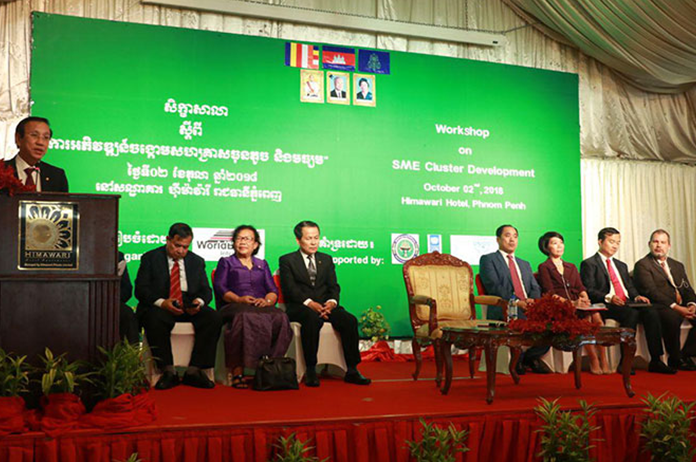SME Parks To Drive Up Competitiveness: Gov’t

Construction of the country’s first ‘cluster zone’ for small and medium-sized enterprises (SMEs) will not start for another few months, but the government is already urging family-owned businesses to join these industrial parks, arguing that they will improve the competitiveness of local firms.
Speaking at a seminar yesterday on the development of SME clusters, Kim Touch, Secretary of State at the Ministry of Industry and Handicraft, said the government is prioritising the SME sector.
“In the sixth mandate of the government, we will continue our work to seek and prepare an incentive policy to help the SME sector as well as finishing the official definition of what constitutes an SME. These tasks require the support of the private sector and our development partners,” Mr. Touch said.
As part of plans to promote growth in the sector, the government is pushing the SME cluster model forward, he said. Yesterday’s seminar was organised by Worldbridge International, who is currently developing the Kingdom’s first SME cluster zone – also referred to as SME eco-park – in Kandal province. Similar industrial parks are planned around the country, the company said.
Mr. Touch said the government wants family-owned companies across the country to join these cluster zones. He said companies that set up in these areas will have access to incentives from the government and will be able to cut down production costs.
“The SME cluster zones will play a key role in helping local companies climb up the regional value chain. To support and assist SMEs, we aim to have a significant number of SMEs join these parks,” he added.
Sear Rithy, chairman of the Worldbridge Group, said construction of Kandal’s SME cluster zone will begin at the end of this year or in early 2019. He said it will serve as a model for many other such industrial parks across the nation.
“The idea is to gather SMEs with similar products in one spot and give them access to cutting-edge technology, including blockchain and the internet of things, that will allow them to manufacture to international standards and to effectively manage the production chain,” Mr. Rithy added.